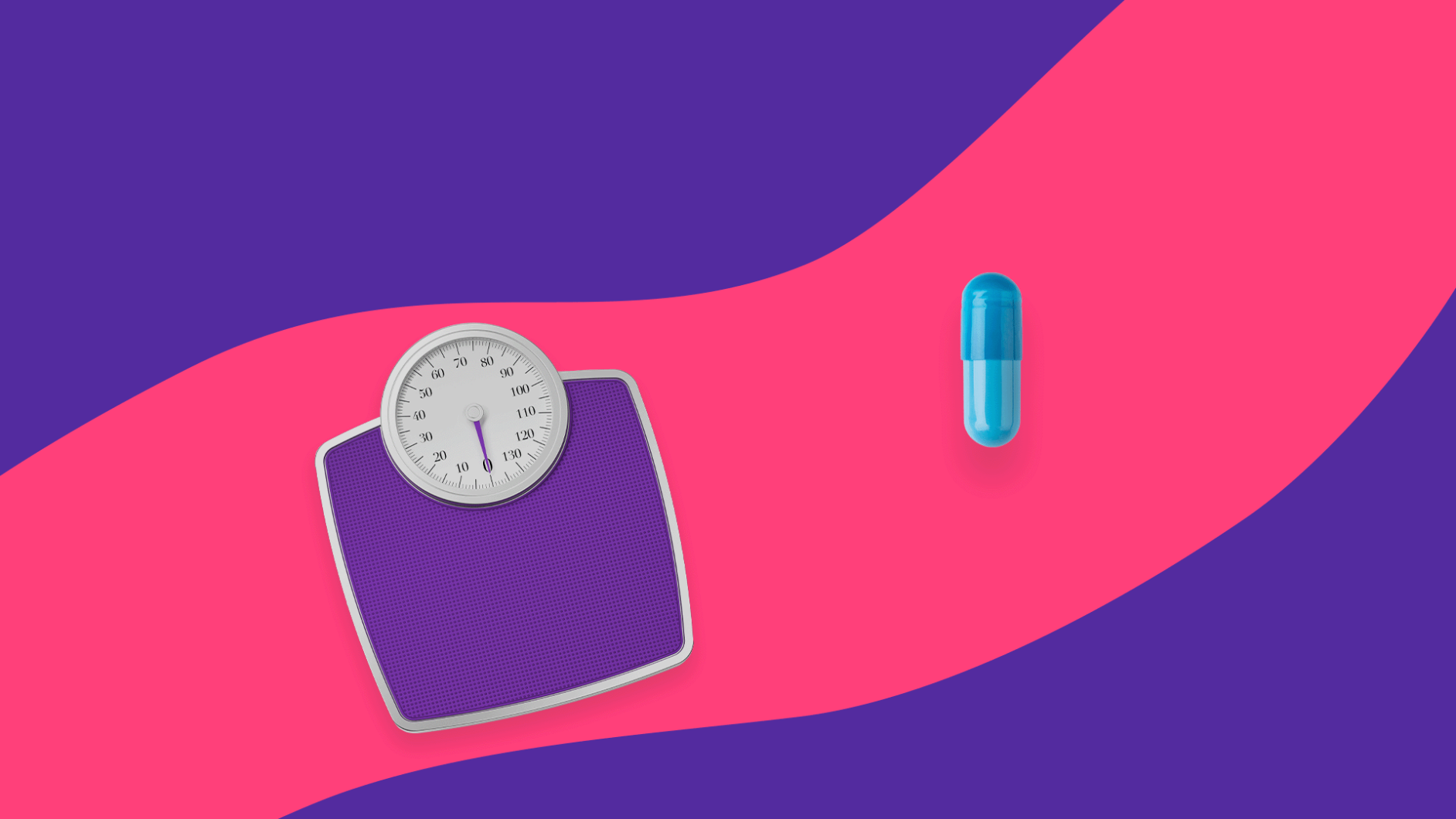If you struggle with your weight, you’re not alone. According to the Centers for Disease Control and Prevention (CDC), 73.6% of adults 20 years and older are overweight, and almost 42% of adults have obesity. You may have tried various lifestyle changes, such as a reduced-calorie diet and increased exercise, and may be interested in trying a prescription medication to help with weight loss. Contrave is an FDA-approved prescription weight-loss medicine. It is a combination medication that contains two active ingredients, naltrexone HCl and bupropion HCl.
Does Contrave cause weight loss?
Before its approval, Contrave was studied in several clinical trials. One of these studies, the Contrave Obesity Research I (COR-I) study, enrolled participants who took either Contrave or placebo (inactive medication) over 56 weeks. All participants also followed a diet and exercise plan. This study found:
- People who took Contrave lost about 5 or 6% (depending on dose) of body weight compared to a 1.3% loss in those who took a placebo
- 39 to 48% of people who took Contrave (depending on dose) lost 5% or more of body weight compared to 16% of those who took a placebo
In the Contrave Obesity Research II (COR-II) study, participants took either Contrave or a placebo for 56 weeks. All participants also followed a diet and exercise plan and received behavior modification advice. The results showed:
- People who took Contrave lost an average of 6.5% body weight compared to about 1 or 2% in those who took a placebo
- 50% of people who took Contrave lost 5% or more of body weight at week 56 compared to 17% of those who took a placebo
- People who took Contrave also reported improved quality of life and control over eating
The COR-Behavior Modification Study (COR-BMOD) combined Contrave (or placebo) with 28, 90-minute small-group intensive behavior modification sessions over 56 weeks. Participants also followed a more specific diet and exercise plan. After 56 weeks:
- 80% of people in the Contrave/behavioral modification group who completed the study lost 5% or more of weight compared to 60% of those who took a placebo
The COR-Diabetes study was a 56-week trial that included people with Type 2 diabetes. Participants took Contrave or a placebo and followed dietary and exercise modification advice. This study found that people who took Contrave:
- Lost more weight than those who took a placebo
- Had improved blood sugar control as measured by hemoglobin A1C
- Had improved triglycerides and HDL cholesterol
How does Contrave cause weight loss?
Contrave contains naltrexone (an opioid antagonist) and bupropion (an antidepressant). These ingredients work together on two parts of the brain—the hunger center and the reward system. The medication helps decrease appetite and control cravings. It does not speed up metabolism.
Who can take Contrave for weight loss?
Contrave can be used (along with diet and exercise) as a long-term treatment for chronic weight management in adults with an initial body mass index (BMI) of:
- 30 kg/m2 or more (obese), or
- 27 kg/m2 or more (overweight) with at least one weight-related condition such as high blood pressure, diabetes, or high cholesterol
Contrave has not been studied along with other weight-loss medications, including prescription medicines, over-the-counter drugs, or dietary supplements. If you take Contrave, you should not combine it with any other weight-loss medication, unless directed to do so by your doctor.
It is not known if Contrave can increase the risk of heart problems or stroke, or of death caused by heart problems or stroke.
What is the Contrave dosage?
Contrave is an extended-release tablet and should be swallowed whole. It should not be taken with a high-fat meal. The tablet should not be crushed, chewed, or cut.
Each Contrave tablet contains 8 mg of naltrexone and 90 mg of bupropion.
Contrave dosing is as follows:
- Week 1: Take one tablet in the morning
- Week 2: Take one tablet twice a day
- Week 3: Take two tablets in the morning and one tablet in the evening
- Week 4 and after that: Take two tablets in the morning and two tablets in the evening
People with certain medical conditions, such as liver or kidney problems, should consult their healthcare provider. If the provider determines it is safe to take Contrave, they may prescribe a lower dose, depending on the medical condition(s).
The maintenance dose is two tablets twice daily, and the maximum daily dose is four tablets per day (taken as two tablets twice daily). After 12 weeks on the maximum dose, the medicine should be discontinued if the patient has not lost at least 5% of their weight.
Is it safe to take Contrave for weight loss?
In addition to the potential benefits, one must also consider the potential downsides of Contrave for weight loss. The best way to do this is to consult your healthcare provider. Your provider can consider individual factors such as medical condition(s) and medical history, risk factors, and other medications you take that could interact with Contrave. In the section “Does Contrave cause weight loss?” above we discussed the potential benefits of Contrave in terms of weight loss. Below, we will consider the side effects.
Contrave side effects
Like any drug, Contrave can cause side effects. The most common side effects of Contrave may include:
- Stomach problems like nausea, vomiting, constipation or diarrhea, and stomach pain
- Headache
- Dizziness
- Trouble sleeping
- Dry mouth
- Increased blood pressure
- Increased heart rate/palpitations
- Anxiety
- Flushing
- Tiredness
- Tremor
- Ringing in the ears
- Urinary tract infection
- Excess sweating
- Irritability
- Rash
- Altered taste
Weight loss may increase the risk of low blood sugar (hypoglycemia) in people with Type 2 diabetes who take insulin or certain diabetes medications such as glyburide or glimepiride. Increased blood sugar monitoring may be required.
Contrave has a boxed warning, or black box warning, which is the most serious warning required by the US Food and Drug Administration (FDA). Although Contrave contains bupropion, which is an antidepressant, Contrave should not be used for depression, other mental health conditions, or for smoking cessation. There is an increased risk of suicidal thoughts or behaviors in children, adolescents, and young adults who take antidepressant medication (even though this medication is not used for depression).
There is also a risk of other neuropsychiatric disorders in people who take Contrave, with symptoms including hallucinations, panic attacks, homicidal ideation (thinking about killing someone), aggression, extreme increase in talking, and others. People of any age who take Contrave should be closely monitored by family members and caregivers for any changes in mood, behavior, thoughts, and feelings. Any changes should be immediately reported to the healthcare provider. Contrave is not approved for use in children.
Other serious side effects may occur, which include:
- Severe allergic reaction (symptoms such as hives, difficulty breathing, chest pain, or swelling of the face, lips, tongue, or throat require emergency medical help)
- Severe skin reactions (the following symptoms—fever, sore throat, burning eyes, skin pain, red or purple rash, blistering or peeling skin—require emergency medical attention)
- Liver damage
- Heart attack
- Severely high blood pressure
- Seizures
- Angle-closure glaucoma
Who should not take Contrave
Contrave is not appropriate for everyone. Do not take Contrave if you:
- Have uncontrolled high blood pressure
- Have seizures or a history of seizures
- Have end-stage renal disease
- Take other medications that contain bupropion
- Have an eating disorder or history of eating disorders (such as anorexia or bulimia)
- Take opioid-containing medicines or use medications to help you stop taking opioid pain medicines
- Drink a lot of alcohol and then stop drinking
- Take sleeping medicine, anxiety medicine, or anti-seizure medicine and stop taking it suddenly
- Are taking a monoamine oxidase inhibitor (MAOI) medicine
- Are allergic to naltrexone, bupropion, or any ingredient in Contrave
Before taking Contrave, tell your healthcare provider about any medical conditions you have, including heart disease, mental illnesses, head injury, kidney or liver problems, diabetes mellitus, or others.
What to avoid while taking Contrave
While taking Contrave, there are certain things that should be avoided.
- Do not use Contrave if you are pregnant. If you already take Contrave and find out you are pregnant, notify a doctor immediately.
- Do not take any opioid medication (such as oxycodone) for at least 7 to 10 days before starting Contrave. While taking Contrave, do not take any opioid medication, methadone, heroin, or street drugs. The combination could cause a coma or death.
- Do not take an MAO inhibitor medication (such as tranylcypromine, selegiline, or rasagiline) within 14 days before or after taking Contrave.
- Do not take other forms of bupropion such as Wellbutrin.
- Do not take Contrave with a high-fat meal. Taking Contrave with a meal that is high in fat can make you more likely to have a seizure.
- Do not take more than two tablets at once. And, do not take more than a total of four tablets daily (two tablets twice daily).
- Do not take any other weight-loss medications (such as phentermine) while taking Contrave.
- Avoid alcohol while taking Contrave. Alcohol can increase the risk of seizures. If you drink alcohol regularly, consult your healthcare provider. Drinking alcohol regularly and then suddenly stopping can also cause seizures.
- Discuss caffeine intake with your healthcare provider. Excess caffeine, in combination with Contrave, may increase blood pressure.
How to maximize Contrave benefits
- Before taking Contrave, tell your healthcare provider about all the medications you take, including prescription drugs, OTC medicines, vitamins, and supplements. Consult your healthcare professional before taking any new medications to make sure there are no interactions.
- Talk to your healthcare provider about lifestyle changes that you can employ while taking Contrave. For example, you may want to consult a registered dietitian to help design a healthy eating plan that works with your lifestyle. You may also want to start a regular exercise program (ask your doctor before increasing physical activity). You can also ask your healthcare provider about other ways to help you succeed while taking Contrave.
- Before taking Contrave, read the prescription label and information leaflets that come with your prescription. Follow the directions closely. You will start taking Contrave at a low dose, and gradually increase the dose. Ask your healthcare professional or pharmacist if you are unsure how to take Contrave.
- Always swallow the Contrave tablet whole. Do not crush, chew, or break the tablet.
- You can take Contrave with meals—but do not take Contrave with a high-fat meal. Doing so could increase the chance of having a seizure.
- Avoid drinking alcohol while taking Contrave, as this can cause seizures.
- Discuss caffeine intake with your physician before taking Contrave.
- Check in with your doctor after about 16 weeks of treatment with Contrave. If you have not lost at least 5% of your starting weight, the medication should be stopped.
- If your insurance plan does not cover Contrave, you can always use a free SingleCare coupon to save on the cost of your medication. What’s more, you can use the coupon on refills as well.











